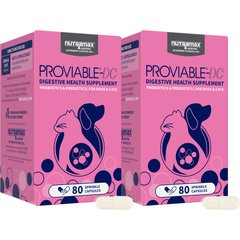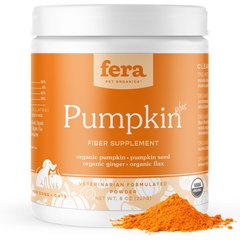Omega-3 Fats May Help with Weight Loss in Pets
We have known for a long time that omega-3 fatty acids DHA and EPA reduce inflammation. These fatty acids also reduce the effect of the inflammatory enzymes produced by body fat. New is the fact that omega-3 fatty acid supplementation may also help to promote weight loss.
Human Studies
From 2007-2011, four studies confirmed that the addition of omega-3 fatty acids to calorie restricted diets for humans resulted in more weight loss than calorie restricted diets that did not include these fatty acids. One study documented a voluntary reduction in food intake by human subjects, suggesting that omega-3’s have a satisfying effect. In children, this weight loss effect was achieved with as little as 300mg of DHA and 40mg of EPA. These amounts are found in the least concentrated commercial formulations.
Recommended Pet Products
- Nutramax Proviable Probiotics & Prebiotics Digestive Health Supplement for Dogs & Cats, 160 count$89.98Chewy Price
- Fera Pets USDA Organic Pumpkin Plus Fiber Support for Dogs & Cats, 90 servings$34.95Chewy Price
- All Four Paws Comfy Cone E-Collar for Dogs & Cats, Black, Small$20.24Chewy Price
- Virbac Epi-Otic Advanced Ear Cleaner for Dogs & Cats, 4-fl oz bottle$12.34Chewy Price
Animal Studies
A 2004 dog study, reported in the Journal of Internal Veterinary Medicine, also found that Beagles on calorie restricted diets lost more weight if the diet included omega-3 fatty acids. A 2006 study in rats showed that DHA supplementation reduced white fat by 57 percent compared to animals not receiving this supplementation. In this study, liver accumulation of triacylglycerol was reduced by 65 percent and liver total cholesterol levels were reduced by 88 percent. Blood levels of triacylglycerol and total cholesterol were reduced by 69 percent and 82 percent, respectively.
Not All Omega-3 Fatty Acids are Created Equally
Multiple studies in animals and humans have shown that preformed DHA and EPA, those found in fish body oil, provide greater tissue levels of these fatty acids than flaxseed or nut oils. In fact, a study in rats showed that dietary amounts of flaxseed and nut oil had to be digested in greater amounts than fish oil to achieve adequate tissue levels in these organs: 12.5 times for liver, 33.5 times for heart, 8.3 times for brain, and 9.1 times for blood. Given that all oils contain 120 calories per tablespoon, flaxseed and nut oils add significant calories to a diet in order to achieve adequate omega-3 fatty acid activity. Fish body oils are clearly the most efficient way to provide omega-3s to the diet.
Why Not Fish Liver Oils?
Cod liver oil and other fish liver oils have been very popular for omega-3 fatty acids, and indeed they are rich in these fats. However, fish liver oils are very high in Vitamin D; dogs and cats have much lower requirements for Vitamin D than humans. Excessive quantities of Vitamin D in pets can result in abnormal calcium and phosphorus levels that can cause mineralization and calcification of vital tissue and organs. Urinary stones can also be promoted by calcium abnormalities. Therefore, fish body oils without Vitamin D are preferred for pets.
Important Restrictions for Omega-3 Supplementation
The National Research Council has established that there is a Safe Upper Limit (SUL) for omega-3s. For adult animals, the amount of omega-3, DHA, and EPA combined should not exceed .37(Wtkg).75. A mathematic or scientific calculator will be necessary to calculate this level. As an example, the SUL for a 20 lb dog would be 1.9 grams of combined DHA and EPA. This is about 1/2-2 teaspoons of most commercial fish body oils.
All oils add 40 calories (kcal) per teaspoon. If fish or other oils are added to a diet, than the same amount of calories must be subtracted by reducing the meal size. As I have emphasized in other blogs, this calorie restriction with foods other than prescription or homemade calorie restricted formulations (over-the-counter weight-control diets are inadequate) may result in nutritional deficiencies.
The Take Home
Omega-3 fatty acids are clearly an excellent adjunct to a weight loss program, but as I have emphasized previously, it is not a DIY (Do-It-Yourself) project. Consult your veterinarian before starting any new diet program.

Dr. Ken Tudor
Image: Animal instinct by Piotr Wawrzyniuk / via Shutterstock




